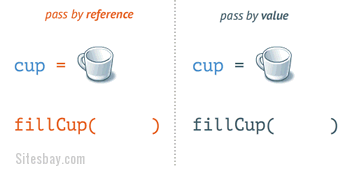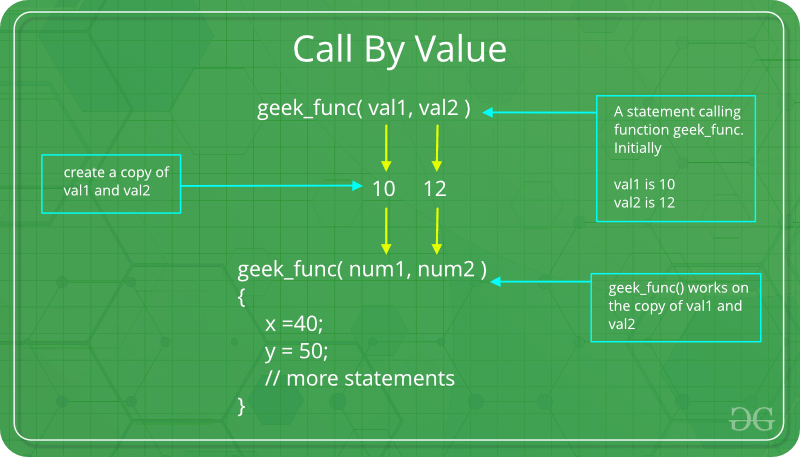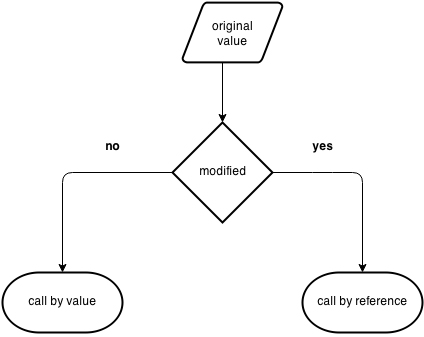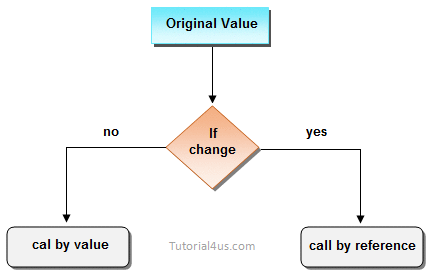What Is A Call By Value In C? : Difference between Call by Value and Call by Reference
Di: Samuel
A pointer type describes an object whose value provides a reference to an entity of the referenced type.Call by value – i. Otherwise, you’ll get a copy of the argument. For instance, the following program passes the array x[] to the . Indeed, it has its own copy of the variable:
Call By Value & Call By Reference in C
The values and variables used with operators are called operands. The function returns the sum of a and b, which is then stored in the variable c. In this method we pass a copy of the variable and not the actual variable to the called function.In C language we can pass arguments to a function using below two ways. Let’s consider a scenario where we .call-by-value-result definition. In call by reference, the same memory address is used by both the formal and actual parameters. This is (was) the standard reason taught in school as it why to pass by value. In C, passing a pointer to an object is, infact, passing that object by reference.

const data_type * pointer_name; Other Types of Pointers in C:
What is call by value in C language?
In the following example we have the num . There are four main cases where you should use pass-by-reference over pass-by-value: If you are calling a function that needs to modify its arguments, use pass-by-reference or pass-by-pointer.

Diese Art des Aufrufs wird im Zusammenhang mit Zeigern näher besprochen (Kapitel 12). दूसरे शब्दों में कहें तो, “इसमें variable के address को actual parameter की तरह function call में pass . In call by value, a parameter acts within the function as a new local variable initialized to the value of the argument (a local (isolated) copy of the argument). C only has call by value, so (formally) all values are passed to functions by value. If the procedure modifies L, these changes will not affect V, which may also be in scope inside the procedure, until the procedure returns when the final . Safety: Original values remain intact, preventing unintended changes, and enhancing program stability.
Call by Value and Call by Reference in C#
Call by Value and Call by Reference in C++: An Overview.) or Reference Data Type (class, interface, delegate, string, etc. Both the actual and formal parameter points to the same address in the memory.
Operators in C
How to Use Functions in C
When the function is called, new memory space is allocated for the function parameters, and the values of the actual arguments are copied into this space.5 A pointer type may be derived from a function type or an object type, called the referenced type.Call by value is the default method in programming languages like C++, PHP, Visual Basic NET, and C#, whereas Call by reference is supported only in Java language.Neben call-by-value existiert auch call-by-reference, womit statt einem Wert eine Adresse kopiert wird. swap(x,y) but taking it as address. Changes made to the parameters inside the function have no effect on the passed parameters which means by default C++ call by value method is used for calling . Call by Value: In call by value copies of the value of variables are passed inside the function, so any changes made to the parameters inside . The values of the actual parameter can be modified in this case since the address of the actual parameter is passed.
Difference between Call by Value and Call by Reference
the call by value method of passing arguments to a function copies the actual value of an argument into the formal parameter of the function.), they will be called by value by default. // won’t change the temporary pointer created on the call side (the argument).In this example, the factorial function is called by value. In C language, we can pass the arguments to a function in two ways: call by value and call by reference. Arguments are . You can declare a function parameter as a pointer, and explicitly use & to pass a pointer to an object in the caller. If you’re new to coding, you might have not heard of Call by Value and Call by Reference in C++ programming language. By writing c = Average(a, b), we are calling the method Average method with 2 arguments ( a and b ). The called function can modify the received value, because it is a local copy, without affecting the original value., passing a copy; Call by reference – this involves pointers; Call by value. In this tutorial, you will learn the difference between call by value and call by reference, how they work, and when to use them. The value of the variable number is passed to the function, and any changes made to num inside the function do not affect the original number in the main function.C passes arguments by value, always, meaning that the called function receives a local copy of whatever the caller refers to. here is simple example.

It is specified in the function’s declaration and can be of . there simply is no true pass by reference in C — This is wrong.Passing by reference in C means passing by pointer. The value of the actual parameters is copied into the formal parameters.In the function, the value of “num” is incremented but there is no change in the value of “number”. // The caller can change the pointer (the parameter), but that.
pass by reference
Pass by reference and value in C++
Natürlich können Sie auch mehrere Parameter in einer Funktion verwenden. When we pass a parameter by value, the caller and callee have two independent variables with the same value. We have passed Average(a, b) and the method is taking Average(num1, num2).
Passes a *pointer* to the object by value. You don’t want the source to be modified by the receiving function outside of its context. Variablen werden beim Methoden-Aufruf an eine Methode mit Call-By-Reference übergeben, wenn nur die Referenz auf den Variablen-Wert im Speicher übergeben wird.
Call by Value and Call by Reference: A Contrast Between C and Java
Enumeration (or enum) is a user defined data type in C.
Function Parameters: Call by Reference vs Call by Value
Call by Value in C++
In this blog post of C++ tutorial, we’re going to take a look at the basics of both concepts in C++.

In the C programming language, the return value refers to the value that a function sends back to the caller after it has finished executing.Answer: An array can be passed to a function by value by declaring in the called function the array name with square brackets ( [ and ] ) attached to the end. It only has pass by value.The first and last are pass by value, and the middle two are pass by reference: sample(&obj); // yields a `Object*`.There are two possible reasons to not use call-by-reference: side effects and privacy. Let us understand Call by Value in C# with some examples. Call by Value variables is passed using a straightforward method, whereas Call by Reference pointers are required to store the address of variables. This is what we say “call by value”. So it is better to . Call by name work as call by reference when actual parameter be scaler, but be different when actual parameter is expression or array then actual parameter is re-evaluated on each access. Dabei wird eine . Any changes made inside the function . Call by Reference in C++.Formally, C doesn’t have pass by reference. Betrachte erneut folgendes Beispiel: Beim Methoden-Aufruf wird nur die Referenz (der Trinkhalm) kopiert. Sie übergeben einer Funktion eine Variable als Übergabeparameter.

In case of call by reference original value is changed if we made changes in the called method. In general, this means that code within a function cannot alter . We will also cover code examples for both methods to help you understand how they work in practice. It generally indicates that a function’s code cannot change the arguments passed to the function during callbacks. Isolation: Method execution occurs in isolation, . In this example we are passing object as a value. In this case, changes made to the parameter inside the function have no effect on the argument. The term passing by reference predates C++. [1] Discussion . Passing by value is cheaper if the value fits within the architecture’s register – or possibly registers if the .The call by value method of passing arguments to a function copies the actual value of an argument into the formal parameter of the function.Integer values and memory addresses are returned in the EAX register, floating point values in the ST0 x87 register.We can pass the value in function two ways call by value or call by reference. Let’s take a simple example: class Operation2 {. Your definition of passing by reference is biased toward C++.C always uses ‚pass by value‘ to pass arguments to functions (another term is ‚call by value‘, which means the same thing), which means the code within a function cannot alter the arguments used to call the function, even if the values are changed inside the function. void swap(int *a,int *b) For example: char *test(char *s) {.In call by reference, the argument variable supplied by the caller can be affected by actions within the called function.Call by Reference.Call by value Approach : Call by value is the default method for passing arguments in C programming.; You can declare a function parameter as a pointer, and pass an array, since when you try to pass an array, .Call By Reference in C in Hindi. If we pass object in place of any primitive value, original value will be changed. So, any change made to the copy of the variable in the called function is not reflected back to the original variable. So any operation performed by function on arguments doesn’t affect actual parameters. Following is the C program for the call by value − Call by Reference Dave Braunschweig.
Call by Value and Call by Reference in C++ ( With Examples )
The pointers pointing to a constant value that cannot be modified are called pointers to a constant. Since the value of the real parameter is copied into the formal parameter in call by value, distinct memory is . Instead of a reference, when a copy of the original value is passed to the function, then it is known as Call by value in C#. By default, C++ uses call by value to pass arguments. integer n; procedure p(k: integer);C Programming & Data Structures: Call By Value & Call By Reference in CTopics discussed:1) Call by value method of passing arguments to a function. but here you are passing values . It is mainly used to assign names to integral constants, the names make a program easy to read and maintain. Now, Average is called and it calculated and returned the average value of num1 and num2 . That means any change on one type of parameter will also be reflected by other. You can simulate pass by reference in two ways:. In call by reference, the argument variable supplied by the caller can be affected by actions within the called function.Call by Value vs. Registers EAX, ECX, and EDX are caller-saved, and the rest are callee-saved.
Call by Value / Call by Reference einfach erklärt
The original value is thus neither modified, nor any change in the passed value will alter the actual value.C# Call By Value. Call by value, also known as pass by value, is the most common way of passing arguments.NET Framework, by default, all the objects are called by value, not called by reference.Call by value and call by reference are two methods of passing arguments to a function in C programming. Call by reference में, एक argument के address को formal parameters में copy किया जाता है.Advantages of Call By Value in C#: Predictability: Call By Value ensures that methods cannot modify the original data, making code behavior more predictable and manageable. Although, we can change the address stored in the pointer to constant.
Call by Value and Call by Reference in Java
Also in most cases you want the data to be private and that someone calling a function only be able to change if you want it. Every other time you pass data to a function (besides scanf), the data . Als Anwendungsbeispiel soll im Folgenden der gregorianische Kalender in den . call by value; call by reference; Call by value in C. Here we can only access the data pointed by the pointer, but cannot modify it. Please refer to the same example below for a better understanding. Discussion [edit | edit source] Call by Value [edit | edit source] Within most current programming languages, parameters are passed by value by default, with the argument as a copy of the calling value. If you’re calling a function that needs to take a large object as a parameter, pass it by const .In call by reference, the address of the actual parameter is passed to the formal parameter. A pointer type derived from the referenced type T is sometimes called .
C Sharp Call By Value
Therefore, if the callee modifies its variable, the effect is not visible to the caller.Call by value is a method in C++ that is used for passing some parameters or arguments to the function which copies the original values of the function to the passed parameters. In the call-by-reference method, the memory address (reference) of the actual parameter is passed to the function, allowing direct access and modification of the original .In C (sans const references), you pass by value for 3 reasons. An argument passing convention where the actual argument is a variable V whose value is copied to a local variable L inside the called function or procedure.
Enumeration (or enum) in C
What is a C Operator? An operator in C can be defined as the symbol that helps us to perform some specific mathematical, relational, bitwise, conditional, or logical computations on values and variables. It is done in different ways in different languages.In call by value, a parameter acts within the function as a new local variable initialized to the value of the argument (a local (isolated) copy of the argument). sample(obj)
Passing by value, passing by reference in C
In C programming, “Call by Value” is a method of passing arguments to functions where the actual value of an argument is copied into a new location of memory. The x87 floating point registers ST0 to ST7 must be empty (popped or freed) when calling a new function, and ST1 to ST7 must be empty on .The values passed to a method are called arguments. We can see these topics later in this article. It only performs the operation on formal arguments. Unwanted side effects are usually caused by inadvertently changes that are made to a call by reference parameter. Was ist der Unterschied zwischen Call-by-Value und Call-by-Reference? Call-by-Value ist die Technik, die Sie bisher immer eingesetzt haben. Hereby mistake, the state of wed is 2, it should be 3. Es existieren folglich zwei Variablen mit Referenzen . Calls by reference are preferred in cases where we do not want to make copies of . In the call-by-value method, the . Example: Call by Reference.Call-by-value sollte Ihnen bereits hinreichend bekannt sein, bei Call-by-reference kommen Zeiger ins Spiel. Within most current programming languages, . In the call by reference, both formal and actual parameters share the same value. So we can say that the operators are the symbols that perform . So, whether it is a Value Type (Primitive data types like int, char, double, etc. However, arrays are handled a bit differently in C compared to other data, so in your first example, the array example is converted to a pointer to its first element, and then that pointer is passed (by value) to the function.Enumeration (or enum) in C. Table of Content: This ensures that the original value of number remains unchanged.Photo by Shahadat Rahman on Unsplash Argument passing in C Language.Refer to the algorithm for the call by value. Example: using System; namespace Func_Example. By default, C programming uses call by value to pass arguments.You can also explore C++ online training so that even novice coders .For example, we can use the following code to call the sum function that we defined earlier: int a = 5; int b = 10; int c = sum(a, b); In this code, we are calling the sum function with a and b as its parameters. Step 1: Enter any 2 numbers at runtime Step 2: Read those two numbers from console Step 3: Call the function swap with arguments is a call by value Step 4: Go to called function swap(int a,int b) Step 5: Print the numbers after swap Example. When calling the function, simply pass the address of the array (that is, the array’s name) to the called function.
- What Is A Japanese Room? _ Japanese Living Room
- What Is A Death Metal Vocal Style?
- What Is A Bent Over Resistance Band Row?
- What Happens If You Eat Borax?
- What Happens In Harry Potter And The Chamber Of Secrets
- What Engine Number Has An Ims Bearing?
- What I Did For Love | A Chorus Line
- What Is A Good Balance Ball Chair?
- What Is A Blackcurrant Fruit? , Unlocking the Health Benefits of Black Currant
- What Does Sumi Mean , Sumimasen(すみません) Can Mean Thank You?
- What Games Can I Play On The Minigames Server?
- What Is A Class Selector? , What exactly does a selector do in angular 2?
- What Happened To The Goth | What Happened to the ‚Lost Colony‘ of Roanoke?